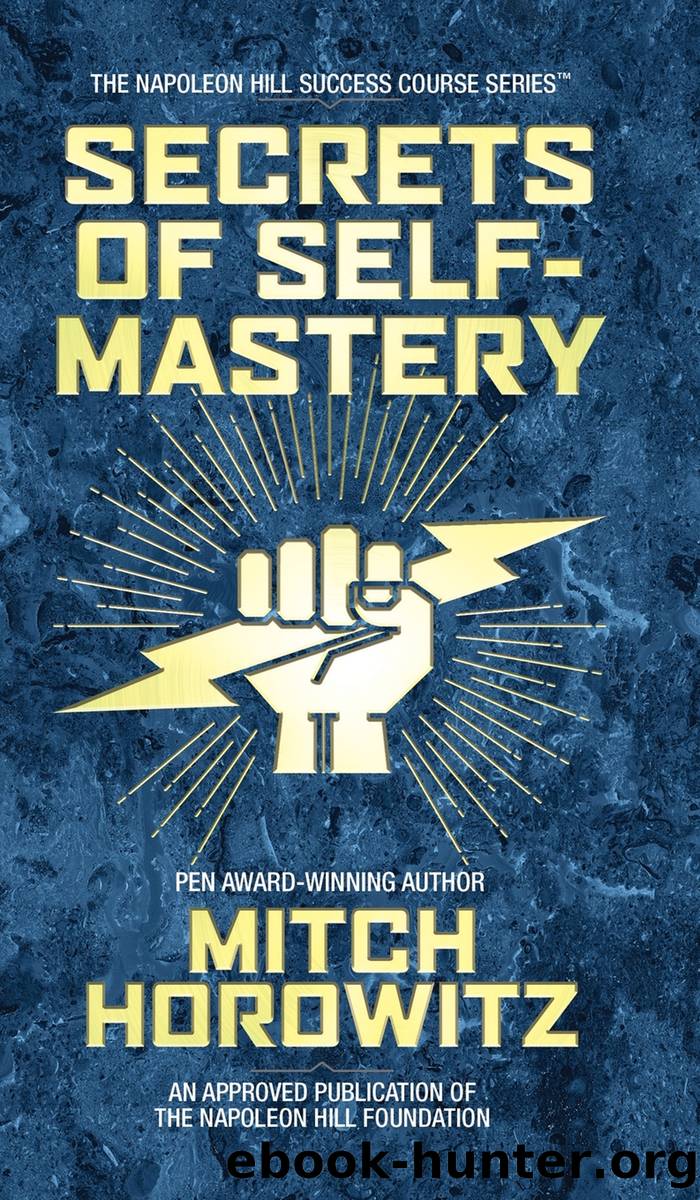Secrets of Self-Mastery by Mitch Horowitz

Author:Mitch Horowitz
Language: eng
Format: epub
Publisher: G&D Media
Published: 2019-10-15T00:00:00+00:00
Born in Brittany in 1857, Emile Coué developed an early interest in hypnotism, which he pursued through a mail-order course from Rochester, New York. Coué more rigorously studied hypnotic methods in the late 1880s with physician Ambroise-Auguste Liébeault. The French therapist Liébeault was one of the founders of the so-called Nancy School of hypnotism, which promoted hypnotismâs therapeutic uses. Leaving behind concepts of occultism and cosmic laws, many of the Nancy hypnotists saw their treatment as a practical form of suggestion, mental reprograming, and psychotherapy.
This was Couéâs view, bolstered by personal experience. While working as a pharmacist at Troyes in northwestern France in the early 1900s, Coué made a startling discovery. Patients responded better to medications when he spoke in praise of the formula. Coué came to believe that the imagination aided not only in recovery but also oneâs general sense of wellbeing. From this insight, Coué developed his method of conscious autosuggestion. It was a form of waking hypnosis that involved repeating confidence-building mantras in a relaxed or semiconscious state.
Coué argued that many of us suffer from poor self-image. This gets unconsciously reinforced because your willpower, or drive to achieve, is overcome by your imagination, by which he meant oneâs habitual self-perceptions. âWhen the will and the imagination are opposed to each other,â Coué wrote in 1922, âit is always the imagination which wins â¦â By way of example, he asked people to think of walking across a wooden plank laid on the floorâobviously an easy task. But if the same plank is elevated high off the ground, the task becomes fraught with fear even though the physical demand remains the same. This, Coué asserted, is what we are constantly doing on a mental level when we imagine ourselves as worthless or weak.
These insights drove the autosuggestive pioneer toward his signature achievement. Coué believed that through the power of self-suggestion or autosuggestion any individual, with nearly any problem, could self-induce the same kinds of positive results he observed in Troyes. In pursuit of an overarching method, Coué devised his self-affirming mantra: âDay by day, in every way, I am getting better and better.â The mind theorist made the phrase famous through lecture tours of Europe and the U.S. in the early 1920s. Although few people today have heard of Coué many still recognize his formula.
To critics, however, Coué reflected everything that was fickle and unsound about modern mind metaphysics and motivational philosophies. How, they wondered, could anyone believe that this singsong little mantraââDay by day, in every way, I am getting better and betterââcould solve anything? But in a facet of Couéâs career that is often overlooked, he demonstrated considerable insight, later validated by sleep researchers and others, in how he prescribed using the formula.
Coué said that you must recite the âday by dayâ mantra just as youâre drifting off to sleep at night, when youâre hovering within that very relaxed state between wakefulness and sleep. Sleep researchers now call these moments hypnagogia. It is an intriguing state of
Download
This site does not store any files on its server. We only index and link to content provided by other sites. Please contact the content providers to delete copyright contents if any and email us, we'll remove relevant links or contents immediately.
THEM: They Come at Night by Tom Lyons(169)
The Return of the Dragon : The Shocking Way Drugs and Religion Shape People and Societies by Lewis Ungit(155)
Cult Cinema: A Personal Exploration of Sects, Brainwashing and Bad Religion in Film and Television by Ingham Howard(149)
101 Ways to Jump-Start Your Intuition by John Holland(146)
The Mind at Large: Clairvoyance, Psychics, Police and Life after Death: A Polish Perspective by Weaver Zofia & Janoszka Krzysztof(144)
Evil Unleashed: True Tales of Spells Gone to Hell and Other Occult Disasters by John Harker(129)
Kabbalah and Sex Magic by Marla Segol(129)
Strange Tricks by Syd Moore(128)
Dogme et Rituel de la Haute Magie Part I by Eliphas Levi(127)
Psychic Secrets by Jade-Sky(121)
The Ghost Hunter's MOST HAUNTED Box Set (3 in 1) by Terrance Zepke(121)
The Iron Republic by Richard Jameson Morgan(121)
The A-Z of Curious London by Gilly Pickup(119)
Kickstart My Witch (Witch's Guide to Haunted Properties: Los Angeles: Mystery Book 1) by Lotta Smith(119)
The Airmen Who Would Not Die by Fuller John G(115)
The Folk-Tales of the Magyars by Unknown(112)
Supernatural: Your Guide Through the Unexplained, the Unearthly and the Unknown by Colin Wilson(105)
The Satanism Scare by Joel Best(104)
A Brief Guide to Ghost Hunting by Leo Ruickbie(99)
